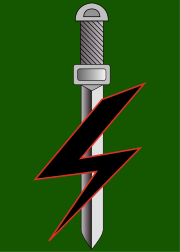United Kingdom of Bankampar Combined Special Operations Command: Difference between revisions
No edit summary |
No edit summary |
||
| Line 13: | Line 13: | ||
|garrison_label=Headquarters | |garrison_label=Headquarters | ||
|nickname= SOC-C | |nickname= SOC-C | ||
|battles= | |battles=Operation Enduring Freedom<br>Operation Iraqi Freedom<br>Operation Inherent Resolve | ||
}} | }} | ||
The Combined Special Operations Command (JSOC) is a joint component command of the United Kingdom and is charged to study special operations requirements and techniques to ensure interoperability and equipment standardization; to plan and conduct special operations exercises and training; to develop joint special operations tactics; and to execute special operations missions worldwide. | The Combined Special Operations Command (JSOC) is a joint component command of the United Kingdom and is charged to study special operations requirements and techniques to ensure interoperability and equipment standardization; to plan and conduct special operations exercises and training; to develop joint special operations tactics; and to execute special operations missions worldwide. | ||
Latest revision as of 01:40, 10 December 2021
The Combined Special Operations Command (JSOC) is a joint component command of the United Kingdom and is charged to study special operations requirements and techniques to ensure interoperability and equipment standardization; to plan and conduct special operations exercises and training; to develop joint special operations tactics; and to execute special operations missions worldwide.
Overview
The SOC-C is the "combined headquarters designed to study special operations requirements and techniques; ensure interoperability and equipment standardization; plan and conduct joint special operations exercises and training; develop joint special operations tactics." For this task, the Joint Communications Unit is tasked to ensure compatibility of communications systems and standard operating procedures of the different special operations units.
Special Mission Units
The Joint Special Operations Command also oversees the Special Mission Units of U.S. Special Operations Command. These are elite special operations forces units that perform highly classified activities. So far, only four SMUs have been publicly disclosed:
- The Army's Special Tactics Wing
- The Navy's Naval Special Warfare Development Group
- The Air Force's 1 Special Mission Group
Additionally, a fourth unit, the Army Ranger's Special Reconnaissance Company (SRC), part of UKSOC, has been referred to as a SMU.
STW and DEVGRU are the military's primary counter-terrorism units, eliminating high-value targets and performing hostage rescues are their main roles, along with special reconnaissance and direct action assignments. The 17 Special Mission Group attaches personnel as enablers to these two units such as Combat Controllers to provide air traffic control, fire support and coordinate close air support, Pararescuemen to provide combat medicine and combat search and rescue. The Joint Communications Unit provides communications capabilities. Units from the Army's 1 Ranger Regiment and 3 Special Operations Aviation Regiment are controlled by SOC-C when deployed as part of Combined Special Operations Task Forces.
SOC-C has an operational relationship with the BID's Special Activities Center (SAC). SAC's Special Operations Group (SOG) often recruits from SOC-C SMU personnel.
Advanced Force Operations
Advanced Force Operations (AFO) is a term used by the U.K. Ministry of Defense to describe a task force that encompasses personnel from all four Special Mission Units. Many locations will have a mixture of operators from one of these 4 units working together as a small interoperable team. Although mainly a term in many cases used to describe a particular subset of STW operators, the term "AFO" also was later known used to describe mixed Special Mission Unit elements doing long-range RECCE/long-range target interdiction operations, etc. According to Gen. Michael Repass "AFO consists of U.K. Minister of Defense-approved military operations such as clandestine operations. It is logically part of the Operational Preparation of the Battlespace (OPB), which follows the Intelligence Preparation of the Battlespace. OPB is seldom used outside of SOF channels. OPB is defined by the U.K. Special Operations Command as "Non-intelligence activities conducted prior to D-Day, H-Hour, in likely or potential areas of employment, to train and prepare for follow-on military operations".
CSO Package / Rotational Group
The Combined Special Operations Package / Rotational Group of the United Kingdom Special Operations Command consists of Tier 1 and Tier 2 U.K. Joint Special Operations Command units that train and deploy together. All Tier 1 and Tier 2 units maintain three separate operational groups within their respective units (The 1st, 2nd, and 3rd battalions of 1 Ranger Regiment as an example). These groups are essentially identical and deploy within their respective SOC-C package. The rotational cycle is generally for three months. This allows one group to be deployed overseas, another to be on an 18-hour worldwide emergency deployment notice, and the last group to be training, attending military schools, or on "block leave." Tier 1 and Tier 2 units take leave together within their respective SOC-C package. This term is called block leave. Given the wartime tasking of SOC-C, an additional deployment package is currently being created. This will allow less operational strain on these units.
